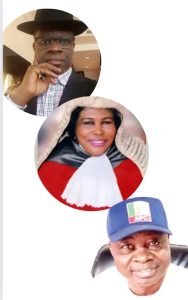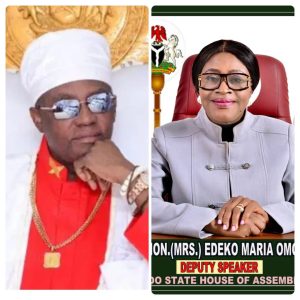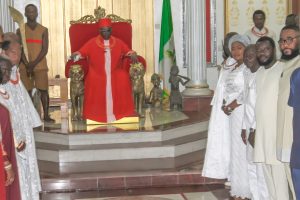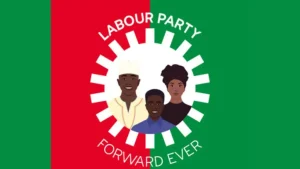Tope Alabi: Trial of a Gospel Singer

By Suyi Ayodele
In the last two weeks or so, Ifa, gospel songs and singers appear to be on trial in Yorubaland. People who shout Oludumare every day now say it is wrong to use other words from the same source to praise God. First it was Oluwo of Iwo, who attempted to throw Ifa under the bus in a newspaper interview. Then came latter day Christians who think they know more than their fathers.
A video of a ministration in a church by the female gospel singer, Tope Alabi, went viral. In the video, the singer used certain words that are considered esoteric. Alabi, who was invited to the microphone by another singer, Aduke Gold, used the words: “Àbọrú, Àbọyè”, to praise God on the altar. The entire music show was more rarefied in content and delivery.

Ever since, the social media space has not been at peace. The video has produced many ‘Babalawos’, who with little or no knowledge of Opele, have jumped into the ring to interpret the meanings of Àbọrú, Àbọyè and Àbọsìsẹ. In the entire noise about the words, many have chosen to be the mouthpiece of God Almighty, and they have told us in clear terms that Tope Alabi is not “a good Christian” and might not make Heaven. Really?
The beauty of the whole thing is that the Àbọrú, Àbọyè, Àbọsìsẹ lexicons have thrown up a new seminar in Yoruba lexicographic, semantics and semiotic analysis. A few ‘digital’ traditionalists had also come into the fray and what we have out there is a combination of ignorance, half knowledge and sheer mischief at giving the gospel singer a bad name to hang her. Here, I would restrain myself from dabbling into the politics of the Gospel Musicians Association of Nigeria (GOMAN), and the group’s attitude to Alabi.
A lot of questions have been playing up in my head over this issue. On of these is if any Babalawo would make Heaven? I have been wondering if Baba Falade, and other ‘saints’ of his era are in Heaven or in Hell. Those Babalawo who practised the Ifa religion before the coming of the white man and his religion, are they in Heaven or in Hell?
But more importantly, I have been trying to figure out any dichotomy between the lexicons Ifa adherents use and those of the Christians. Are there Yoruba words that are of exclusive usage of the initiates, which if uttered in the ‘sanctuary’ of the church, interrogate the spirituality of the user? What are the spiritual and semantic implications of the words: Àbọrú, Àbọyè, and the last of the tripod, Àbọsìsẹ? Are they arcane or mere linguistic realisations of deep-seated Yoruba recherche?
What if I ended up as a Babalawo! Yea, you read me right! I can predict what my wife would say after reading this. She would go on her knees to cast out the ‘evil’ spirit behind this thought and ask Holy Ghost to ‘arrest’ me. My first son would elect to be my first client; he is a liberal fellow. His younger brother would likely say: “Me, I don’t want to be a son of Babalawo o”; and he would laugh. Oh yes, the eldest of my siblings, Anti mi Idowu, would shout “Blood of Jesus”. My pastors would argue that they had long suspected my claims to ‘Born Againism’. “Brother Ayodele is not broken”, many in the church would conclude. In all, the Lord will still be Lord. As for me, I would only be fulfilling a family atavistic regression. I will not be the first of the Obajusigbes to follow where his Ori (destiny) takes his feet.
The first of my father’s siblings was Baba Daniel Falade Obajusigbe, simply Baba Falade. He died January 20, 1987, at the ripe age of 85. He was the Obajemu (head of Ukutanyin unit comprising Isalu, Idofin and Iboje) of Odo Oro Ekiti. He was equally the Aoro Orangun (Chief Priest of our family deity). He held the two inseparable positions for 52 years, having been installed as Obajemu Aoro Orangun in 1935, at the age of 33 years. But before then, he was a Lay Reader of the Anglican Communion, Saint Andrew’s Anglican Church, Odo Oro Ekiti.
We are a family of spiritual people, which in the traditional parlance is called Omo Abe Ala (Children from the inner shrine). The first Lay Reader in our locality was one of our fathers, Pa Emmanuel Olaniyi. Pa Olaniyi, a Lay Reader of the All Saints’ Anglican Church, Oke Bola, Ikole Ekiti, for over 70 years! The last of the first generation of Obajusigbe to die, Pa Johnson Kolawole Obajusigbe, was also a Lay Reader of the same church. But along the line, Baba Falade ended up as a Babalawo, the very best of his epoch. You are wondering how a Lay Reader turned out to be Babalawo, right? Let me tell you how it happened.
Baba Falade, on several occasions told the story of his ‘conversion’. According to him, he was baptised as an Anglican communicant and learnt the Bible and got ordained a Lay Reader He was also versed in the religion of his forebears, Ifa. Sometimes, while waiting at the pew (your modern-day Minister’s Stand) to officiate, a pregnant woman who had been having difficulty to deliver smoothly would be brought into the family house and Baba Falade’s attention would be called.
Using the back door to the Vestry, the old man would go and attend to the pregnant woman. Lest I forget, Baba Falade was equally a traditional midwife and pediatrician known as Aremo. He used herbs and roots to attend to ailments of pregnant women and children. It could also be a case of a child who suffered convulsions and fainted and Ayajo (invocation) was required to bring him back to life. Baba Falade was also handy in that. After the feats, he would return to play his role as a Lay Reader.
Then one day in 1930, years after his ordination as a Lay Reader, a palm reader cum Babalawo came to our town on a ‘missionary’ journey. He was quartered in Baba Falade’s house. The visiting Babalawo read many palms and made predictions, which all came to pass. In case you don’t know, a man versed in palmistry studies your palm and tells you what the future holds for you; and what he says happens later in life. One evening, after attending to so many clients, the palm reader asked Baba Falade to bring forth his palm for reading.
According to Baba Falade himself, after reading his palm, the visiting Babalawo said, I am quoting Baba Falade now: “Falade, you are just wasting your time in the church. You will end up with the religion of your fathers.” End of prediction. Months later, the Laity of the Anglican Communion, Ikole Diocese, moved Baba Falade up the ladder of Lay Readership. He became a Chief Lay Reader. Did the church authority hear about the palm reading? Nobody knew. He was just promoted.
Fate waited for the appointed time. The reigning Obajemu Aoro Orangun, Adalumorinbiibon Awe, died in 1934. After his rites of passage, the natural successor, Baba Olaniyi declined the position on account of his Christian Faith. Ifa was then consulted for a replacement. Every divination cast pointed at Baba Falade as the choice. In the year of our Lord 1935, five years after the palm reader’s prediction, Baba Daniel Falade Obajusigbe was installed as Obajemu Aoro Orangun of Ukutanyin. I have seen pastors and I have seen diviners. I am yet to see anyone who could quote the Bible copiously as Baba Falade. While on his divination ‘services’, after reciting the panegyrics of the emerging Odu Ifa (Ifa Corpus), Baba Falade would do biblical allusions. He was a consummate traditionalist.
It is true that when a child has not seen another man’s farm, he would boast that there is no other farm as big as his father’s. Without sounding immodest, Babalawo who understood Ifa more than Baba Falade in the entire Egbeoba of yore, were very few. He was a dynamic traditionalist and an “Eni Owo” (The Reverend). His divination predictions were as accurate as those of Adifa se bi aje of Oba Adeyemi 1 era in the old Oyo Empire! His mastery of the Bible as a Lay Reader was legendary; his dexterous rendition of Ifa corpus, infectious and his recitations, without repetition of Ayajo, inimitable. Probably, Baba Fagbewesa, the late Alamoeku of Ikoyi Ekiti, would be in the same class. The story of Baba Falade and an equally renowned Babalawo, Oloyeloogun of Isaba Ekii, the father of the late Ekiti traditional musician, Elemure Ogunyemi, tells you more of the man called Baba Falade. Today, however, is not for that story. We have a topical topic to debate today.
The internet Babalawos, who have joined the Tope Alabi debate told us that Àbọrú, Àbọyè and Àbọsìsẹ, are three daughters of Olodumare (Supreme God), that any Babalawo who wishes to get anything from Olodumare must worship. They cited Ògúndá Méjì as the Ifa Corpus containing the story. We are not disputing that claim. It is a common knowledge that in Yoruba culture, as in many African cultures, certain professions and crafts attract special greetings. For instance, if one runs into a hunter on the path to the forest, the hunter is saluted as “Arinpa Ogun, or owo a de” to wish him success in the game hunting expedition. For a blacksmith, the greeting is “Aro ye” (May the shape come out as desired). While a Yoruba Oba is saluted as Kabiyesi (The unquestionable one), his chiefs receive the salutation “Ebo afin, eru a da” (May the sacrifice and the offering be acceptable).
So, for a Babalawo, who is on a divination session, the greeting is Àbọrú, Bọyè and Bọsìsẹ (Àbọrú, Àbọyè, Àbọsìsẹ). The simple Yoruba semantic implications of the greeting are: Àbọrú, (May you spring up as you worship), Àbọyè (May you live as you worship) and Àbọsìsẹ (May what He [object of worship] says come to pass as you worship).
The question now is, are these words and their meanings in tandem with Christianity or if uttered in a church, do they situate the user as an unbeliever? if Tope Alabi said in that praise and worship session that God is Àbọrú, Àbọyè, and added, Àbọsìsẹ, has she committed any sacrilege? What is the position of the Bible in Psalm 22:3? Does God no longer dwell in the praises of His people? Is it not true that when we worship God, we spring up like Cedars of Lebanon, we live and anything He pronounces on us is fulfilled?
If it is true that Àbọrú, Àbọyè, Àbọsìsẹ are special women of Ifa or Babalawo, have they no significance in the Holy Trinity? What do we have in Christendom: God the Father, God the Son, and God the Holy Spirit. Have we ever thought of why Ifa and Babalawo pay attention to the trinity? For instance, when the men of the ancient Ilubirin (The town of women) wanted to get their freedom from their oppressive wives, they consulted three Babalawos: Igbo-Etile-Tohun-Tegbin (The bush close to the house attracts dirt) Adapo-Owo-Tohun-Tija (Trade partnership results in fight) and Emi-O-Ju-O-Iwo-o-Ju-Mi-Ni-Mu-Ara-Ile-Eni-F’oju-Dini (Too much familiarity brings contempt). In another instance, when an old Babalawo known as Ologbojigolo wanted to embark on a divination journey, he consulted three other diviners: Ehiniwamowo (I look at what is in the front from the back), Moworere (I look intently) and Mowojojo (I look searchingly). Are these instances mere coincidences? What about the trickster Deity, Esu? Where does he live? Why does he reside at “Orita Meta” (There-way junction)?
At the mount of Transfiguration, as recorded in Matthew 171-3, our Lord Jesus Christ took only three of His disciples (Peter, James, and John) along with Him. Why not four out of 12? On the mountain, Peter suggested that they should build three tabernacles, each for Jesus, Moses, and Elisha. We may need to ask who owns the idea of the Trinity between those men who had their religion before the white man came with his own religion, and the white invaders of our spiritual space. One, definitely, copied from the other, or the two are the same in different cultures.
More intriguing is one of the praise names of Ifa as “Eleri Ipin” (He who witnesses destiny). If Tope Alabi had called God an “Eleri Ipin”, would she have been wrong? How would a Yoruba student of hermeneutics interpret Jeremiah 1:5 to wit: “Before I formed thee in the belly I knew thee, and before thou camest forth out of the womb I sanctified thee, and I ordained thee a prophet unto nations?” In 1 Samuel 16:7, we are told that God looks into the heart. Luke 16:15 affirms that by saying “God knoweth your hearts”. We don’t dispute that. Now a Babalawo praises his Ifa as “Arinu rode, olumoran okan” (The one who sees in the inside and the outside, he who knows the thoughts of the heart).
If a Yoruba gospel singer now praises God as “Arinu rode, olumoran okan”, are the Scriptures above not true? Often time, we hear our pastor call God as the “First and the last, the beginning and the ending” and we clap and cheer. I would like to be educated if that is different from the “Iwaju Opon Ifa (The front of Opon Ifa), Eyin Opon Ifa (The back of Opon Ifa); Olomun Otun (The carer on the right side) and Olokanranlosi (The wise person on the left side). Our choristers sing “Afuye gege ti o se gbe (He who is light but heavy to lift), Jigbinijigbini bi ate Ileke (Looking big and heavy as ware of coral beads). We all join and praise God.
Now replace “ileke” (which is the beads worn on the waist) with “Akun” (neck coral beads) and you will have “Jigbinijigbini bi ate akun”. Has it ever occurred to any Christian that that same cognomen is that of Arole Oodua, the Ooni of Ife, who answers “Jigbinijigbini bi ate akun and Ite Omo Irunmole (The throne of the son of 200 gods), among other names? What about Ela, the son of Orunmila? Ifa says he was born of a woman who never had any intercourse with a man. Orunmila means Heaven knows who will be rich or be saved, depending on the context. The Bible in Romans 9:16 says: “So, it is not of him that willeth, nor of him that runneth, but of God that showeth mercy.” Any correlation?
Years ago, as the president of the Men’s Fellowship of my church, we had an issue that required the attention of our Provincial Pastor (PP), as they were called then. However, when we were to go and see the pastor, I had an assignment outside town. So, I delegated about four other men to go and see the man of God. When they got to his office, they introduced themselves and were about to tell him their mission, when the pastor, a Yoruba man, stopped them and asked for what they brought. The men answered in the negative and the pastor sent them out to go and study their Bible very well.
According to them, they contributed some amount of money and put it in an envelope. They went back to the pastor, handed over the envelope to him and he then listened to them. One of the men who narrated the incident to me, was very bitter that a Man of God would first collect money from his parishioners before listening to them. I laughed. The member of the delegation did not find it funny, but I insisted that the pastor was right in asking for what they brought.
After I returned from my journey, I led a new delegation to see the pastor. It was a Thanksgiving Sunday. A family had brought a live goat as part of the items for thanksgiving. I sought and obtained the permission of the zonal pastor to take the goat along to see the PP. I also added some amount of money. On getting to the pastor’s residence, I presented the money, the goat, and other items to him. He welcomed us and listened to us again. He explained why the church leadership took the decision it took and why it could not be reversed. We were satisfied with his explanations and after praying for us, we left.
The pastor, while seeing us off to our cars, pulled me aside and said to me: “My president, omo agba ni e” (My president, you are a child of the elders). In the car, one of the men asked why it was necessary to give those items to the pastor. I answered by telling him that it is Biblical that no one goes to see a prophet or a seer without a gift. The Bible recorded in 1 Samuel 9:7-9 that to go and see the Prophet, Samuel, over the lost asses, Saul asked what they had to give to the seer. The same practice is recorded in Ifa. Nobody goes to a Babalawo without a gift for Ifa. As a matter of fact, it is the money that the client brings that he speaks to and the Babalawo would place it by Opon Ifa before casting the Opele.
The problem between Ifa religion and the modern-day religions especially Christianity, is due to the way the religion, Christianity, came to our land. The first set of ’converts’ were moderate and temperate in their relationship with the traditions of the people. The second generation of Christians started their “Bibeli mi ni hun o ma gbe song (It is my Bible that I will carry) and “Ifa o lagbara bii ti re; Opele o lagbara bii ti re (Ifa is not as powerful as it is; Opele is not as powerful as it is) crusade and began to distort the facts about the religion of the people. The era of Pentecostalism has taken the matter to the next level. The early 70s Born Again Christians and their fanatical propensities labelled those not in the same Faith with them as heathen. They don’t equally spare fellow Pentecostals who have different doctrines. When the disciples spoke in tongues on the day of Pentecost as recorded in Acts 2, nobody queried them. But in the year of the Lord 2023, a gospel singer used her deep Yoruba language to worship her God, she is labelled an Ifa devotee. I wish we could go back to the days when, in the village, after Sunday Holy Communion, our fathers would pick up their guns and head to the deep forest to harvest venison for us. And when they returned in the evening, we gathered to watch them chant their Ijala Are Ode (Hunters Chant) to wit:
Igbagbo o ni kii nma s’ode – Being a Christian does not foreclose me from hunting (2ice)
Ti nba ti church de – Once I return from church
Ma mura Egan – I head to the forest
Igbagbo o ni kii nma sode – Being a Christian does not foreclose me from hunting.







